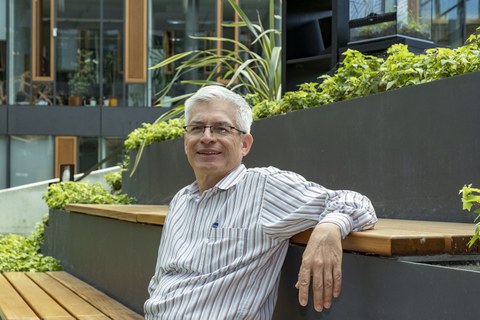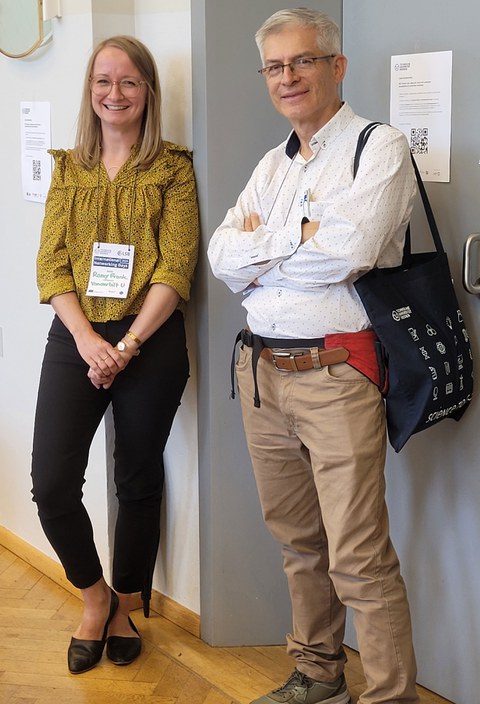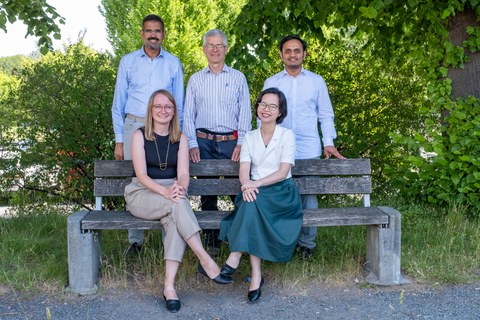Research, learn and get involved!
(interviewed in the year 2024)
Thomas Scheufler
“I'm happy that I've been able to develop so far professionally.” Simon Barbosa looks back on an impressive career as a Diplom-Ingenieur for Telecommunications Engineering and is a well-connected TUD Alumni Ambassador in Colombia.

Simon Barbosa is a member of the TU Dresden International Alumni Council.
| Profile |
Simon Barbosa |
| Degree program | Telecommunications Engineering |
| Faculty | Former "Friedrich List" University of Transport and Traffic Sciences |
| Study period | 1982 - 1988 |
| Current work | Self-employed |
| Regional Ambassador | for Columbia since 2017 and as a member of the International Alumni Council since 2023 responsible for Latin America |
Why did you decide to study at TU Dresden?
There was an agreement between Colombia and the German Democratic Republic (GDR) that allowed Colombians to study in the GDR on a scholarship. I applied for one of these scholarships and got it. Yes, and because I was interested in pursuing a technical discipline when I graduated from high school, I thought about TUD – because this university has a good reputation – and also because of the beautiful city of Dresden and its surroundings. I actually studied at the University of Traffic Science, which became a part of TUD after the reunification of Germany. I am very proud that I studied in Dresden.
What made you choose this degree program?
As a child and while I was at school, I already showed an affinity for technology. I was interested in how and why electrical devices work. I became a Diplom-Ingenieur for Telecommunications Engineering because I found it fascinating how people can communicate with each other over long distances with the help of technical devices and systems.
Who from research and teaching influenced you the most during your studies?
One example was Prof. Gottfried Fritzsche from Systems, Fields, Waves – his lectures were very interesting and fun. And my fellow students Manuel Palacios, Danilo Alaniz and Thomas Zschoern – we often studied together.
Where are you employed today, and what are your responsibilities?
I became a pensioner last year. Up until then, I worked for the Colombian army. I mostly worked as a telecommunications engineer, firstly as a teacher at the army’s telecommunications institute, then as a field engineer, project engineer and director of armed forces networks. At the end of my career, I worked with some universities (including Universidad de los Andes and the Universidad Nacional) on research projects to solve critical problems confronting the army.
Watch the video clip to find out what Simon studied in Dresden, what advice he gives students and how he builds bridges to Colombia as a TUD regional ambassador. © C. Queitsch / J. Thiele
What advice would you give to our current first-years?
In the past few decades, the whole world has got more complicated. Climate change, environmental crises, wars, epidemics, and more have caused major problems everywhere. This is why I recommend today's students to research and learn as much as they can about their discipline and to enjoy their time as a student. I also encourage them to stay well-informed about what is happening in their home countries and the world, and to get involved with politics.
What do you remember most fondly about your time as a student?

Simon Barbosa (r.) with Romy Frank, Councilmember for North America.
The social and academic conversations I had with my classmates and other students. From a social perspective, I loved the diversity and all the activities I did with my classmates and friends, like celebrating carnival in February, going to the disco or the cinema, or visiting a museum. Back then, there were cafés on Prager Strasse where I liked to sit with friends and chat over a cup of coffee. Those were great moments to get to know people. And almost four decades later, I'm still in contact with some of them.
What was your favorite place on campus?
I always liked going for a walk around the campus. I would sometimes spend the evenings having fun in the Mensa canteen with friends and acquaintances. But my favorite place was the library, which provided me access to a wealth of knowledge and insights.
What still has a lot of value for you today/would you like to have had more of?
Throughout my professional career, I have benefited from the theoretical and practical skills I acquired during my studies. And discipline, organization and good habits have helped me in my daily life too.
What tips do you have for hitting the ground running in your industry?
My engineering degree in telecommunication technology gave me many opportunities both in academia, industry and government administration. I'm happy that I've been able to develop so far professionally with what I've studied.
What connects you to TU Dresden today?
I am very grateful to TUD and to Germany because Dresden and the uni were my homes while I studied. And now I want to help TUD achieve its goals today. I am currently a member of TUD's International Alumni Council*, where I am responsible for Latin America.

Simon Barbosa (top center) and other alumni members of the TUD International Alumni Council.
You are also a TU Dresden regional ambassador. As a TUD regional ambassador, how can you currently support TUD members who are interested in studying or conducting research in your country?
Here in Colombia, I am part of the ASPREA association, which is an association of people who studied in Germany. We have around 300 members who work in academia and industry. If a TUD member is interested in a study visit or a research cooperation program with a Colombian organization, they can use it to get in touch with the right people.
What opportunities for cooperation do you see for the future?
Colombia is a large country and has a rich biodiversity, varied landscapes and endless rainforest. That is why I see current and future opportunities for research cooperation in the fields of environmental protection, renewable energies, sustainable technologies, forest sciences, water sciences and educational sciences.
Contact:
Simona Barbosa
whatsapp: +573192441715
* The International Alumni Coucil consists of eight selected regional ambassadors. They bundle the communication between the regional ambassadors of their respective continent and the TUD Alumni Office. Simon Barbosa is responsible for Latin America.
